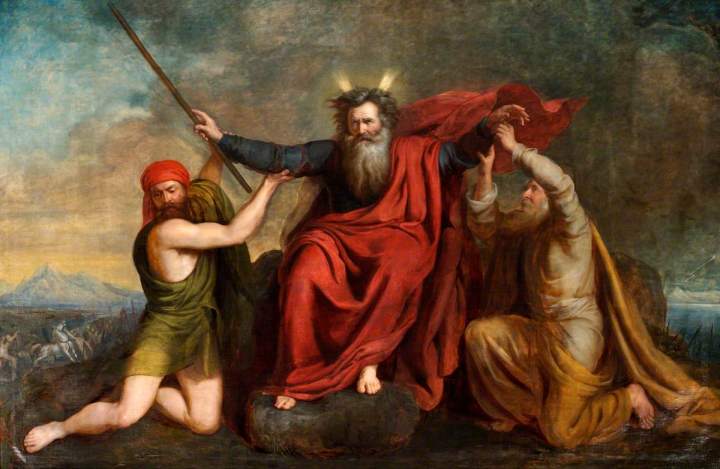What’s the point of it all? It’s a question people ask, and thankfully the church has an answer. Humanity exists to love God and serve him in this life, and to enjoy Him in the next. We are made for worship. Nothing else matters: work, family, friends. They’re not bad in themselves, but compared to our relationship with God, they are secondary. Worshipping God is a way of saying that God is the most important thing in our lives. We love God more than our family, our friends, even ourselves. It’s radical and counter-cultural, because it says that our immortal soul matters more than wealth, or power, or prestige. What we are doing is the most important thing we can ever do. It’s what we are made for. To worship God.
In the first reading this morning from Exodus we see what prayer can achieve. Our life is a battle, just like that fought between Israel and the Amalekites. And we can conquer in spiritual matters by keeping our arms raised in prayer, and helping others by supporting them. The church is a community where we help each other, where we bear each other’s burdens. We pray for ourselves and others, and we are prayed for, so that all around the world, every moment of every day, we are surrounded and upheld by Christians praying for us, not to change God’s mind, but to change us.
It is something which Paul’s Second Letter to Timothy shows us is something we need to learn, to believe, and to continue doing. Prayer isn’t grand, it’s a bit of a slog, it takes a lifetime. It has to be taught, it is what preaching is for. Teaching the faith, and telling people who Jesus is (the Son of God, born of the Virgin Mary) and what He does (preaches repentance, the forgiveness of sins, dies on the Cross, and rises again). It is easy to pervert this into a message which makes few demands upon us, that says, “yes, you’re all fine, you don’t need to do anything”. Christianity makes demands of us. We have to do certain things, which we might prefer not to do, and not do things we might rather like to do. We all need to reminded about this regularly, to help us stay on track. This also helps us to pray well together.
In this morning’s Gospel Jesus teaches us ‘to pray and not lose heart’ (Lk 18:1) It is important advice. Especially when times are difficult. He teaches us with a parable. There is an unjust judge. He’s corrupt, and he’s fed up, so he gives in, for a quiet life, with the result that the widow receives what is right. God can indeed use many things The point is that the widow is persistent: she keeps on, so that he has to listen to her in the end. So likewise Christian prayer should be unceasing. The widow’s prayers turn wickedness and injustice into mercy and justice. Likewise our prayers do not change God, but instead they change us. That’s the point of prayer not to change God’s mind, but to change us, into what God wants us to be. Persistent prayer can, and will change us. It is how saints are made: through prayer. It takes WORK, but it is wonderful, and worth it.
The parable reminds us that God hears prayer. He may not always answer it in a way we might like. Sometimes God says no, or not yet, which we might not want to hear. It teaches us patience and wisdom, and even if we suffer, we grow through it. Our growth in holiness can be painful and difficult. In the first reading from Exodus, Moses is clearly tired, he has to be held up by Aaron and Hur. In Paul’s letter to Timothy, he is not advising something popular, but something unpopular, that people will not want to hear.
The Gospel ends with the question (v. 8): ‘Nevertheless, when the Son of Man comes, will he find faith on earth?’ It’s an important question. If we look at statistics, then people in this country are becoming less religious. Fewer people have faith. There are many reasons for this, and this is not the place to explore them. Solutions are likewise not simple, or straightforward. We can do many things, but we need to make sure that our own faith is strong and attractive, and be prepared to bear witness to it, regardless of the cost. Our faith can only be attractive when it is REAL. This is what will encourage people to follow our example, and come to know and love Jesus Christ. Only in this way can real living faith be transferred so then when Christ comes, as He surely will, He will find faith on earth. So let us trust Christ, knowing that His promises are true, that He feeds us with His Body and Blood in the Eucharist to give us life in Him. Let us love the one who loves us, who gave His life for us, to take away our sins, to heal us and restore us. And healed and restored by Him, let us bear witness to Him, so that the world may come to believe and give glory to God the Father, God the Son, and God the Holy Spirit, to whom be ascribed as is most right and just all might, majesty, glory, dominion, and power, now and forever. Amen.



